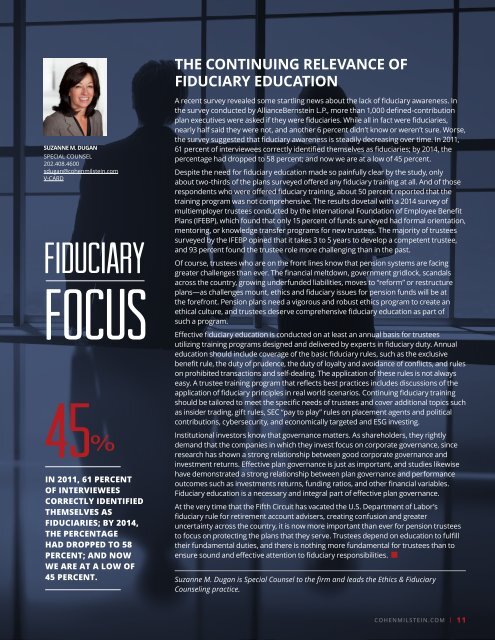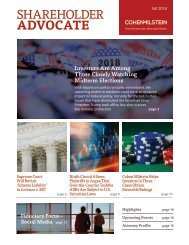Shareholder Advocate Spring 2018
You also want an ePaper? Increase the reach of your titles
YUMPU automatically turns print PDFs into web optimized ePapers that Google loves.
THE CONTINUING RELEVANCE OF<br />
FIDUCIARY EDUCATION<br />
SUZANNE M. DUGAN<br />
SPECIAL COUNSEL<br />
202.408.4600<br />
sdugan@cohenmilstein.com<br />
V-CARD<br />
Fiduciary<br />
FOCUS<br />
45 %<br />
IN 2011, 61 PERCENT<br />
OF INTERVIEWEES<br />
CORRECTLY IDENTIFIED<br />
THEMSELVES AS<br />
FIDUCIARIES; BY 2014,<br />
THE PERCENTAGE<br />
HAD DROPPED TO 58<br />
PERCENT; AND NOW<br />
WE ARE AT A LOW OF<br />
45 PERCENT.<br />
A recent survey revealed some startling news about the lack of fiduciary awareness. In<br />
the survey conducted by AllianceBernstein L.P., more than 1,000 defined-contribution<br />
plan executives were asked if they were fiduciaries. While all in fact were fiduciaries,<br />
nearly half said they were not, and another 6 percent didn’t know or weren’t sure. Worse,<br />
the survey suggested that fiduciary awareness is steadily decreasing over time. In 2011,<br />
61 percent of interviewees correctly identified themselves as fiduciaries; by 2014, the<br />
percentage had dropped to 58 percent; and now we are at a low of 45 percent.<br />
Despite the need for fiduciary education made so painfully clear by the study, only<br />
about two-thirds of the plans surveyed offered any fiduciary training at all. And of those<br />
respondents who were offered fiduciary training, about 50 percent reported that the<br />
training program was not comprehensive. The results dovetail with a 2014 survey of<br />
multiemployer trustees conducted by the International Foundation of Employee Benefit<br />
Plans (IFEBP), which found that only 15 percent of funds surveyed had formal orientation,<br />
mentoring, or knowledge transfer programs for new trustees. The majority of trustees<br />
surveyed by the IFEBP opined that it takes 3 to 5 years to develop a competent trustee,<br />
and 93 percent found the trustee role more challenging than in the past.<br />
Of course, trustees who are on the front lines know that pension systems are facing<br />
greater challenges than ever. The financial meltdown, government gridlock, scandals<br />
across the country, growing underfunded liabilities, moves to “reform” or restructure<br />
plans—as challenges mount, ethics and fiduciary issues for pension funds will be at<br />
the forefront. Pension plans need a vigorous and robust ethics program to create an<br />
ethical culture, and trustees deserve comprehensive fiduciary education as part of<br />
such a program.<br />
Effective fiduciary education is conducted on at least an annual basis for trustees<br />
utilizing training programs designed and delivered by experts in fiduciary duty. Annual<br />
education should include coverage of the basic fiduciary rules, such as the exclusive<br />
benefit rule, the duty of prudence, the duty of loyalty and avoidance of conflicts, and rules<br />
on prohibited transactions and self-dealing. The application of these rules is not always<br />
easy. A trustee training program that reflects best practices includes discussions of the<br />
application of fiduciary principles in real world scenarios. Continuing fiduciary training<br />
should be tailored to meet the specific needs of trustees and cover additional topics such<br />
as insider trading, gift rules, SEC “pay to play” rules on placement agents and political<br />
contributions, cybersecurity, and economically targeted and ESG investing.<br />
Institutional investors know that governance matters. As shareholders, they rightly<br />
demand that the companies in which they invest focus on corporate governance, since<br />
research has shown a strong relationship between good corporate governance and<br />
investment returns. Effective plan governance is just as important, and studies likewise<br />
have demonstrated a strong relationship between plan governance and performance<br />
outcomes such as investments returns, funding ratios, and other financial variables.<br />
Fiduciary education is a necessary and integral part of effective plan governance.<br />
At the very time that the Fifth Circuit has vacated the U.S. Department of Labor’s<br />
fiduciary rule for retirement account advisers, creating confusion and greater<br />
uncertainty across the country, it is now more important than ever for pension trustees<br />
to focus on protecting the plans that they serve. Trustees depend on education to fulfill<br />
their fundamental duties, and there is nothing more fundamental for trustees than to<br />
ensure sound and effective attention to fiduciary responsibilities.<br />
Suzanne M. Dugan is Special Counsel to the firm and leads the Ethics & Fiduciary<br />
Counseling practice.<br />
COHENMILSTEIN.COM I 11



